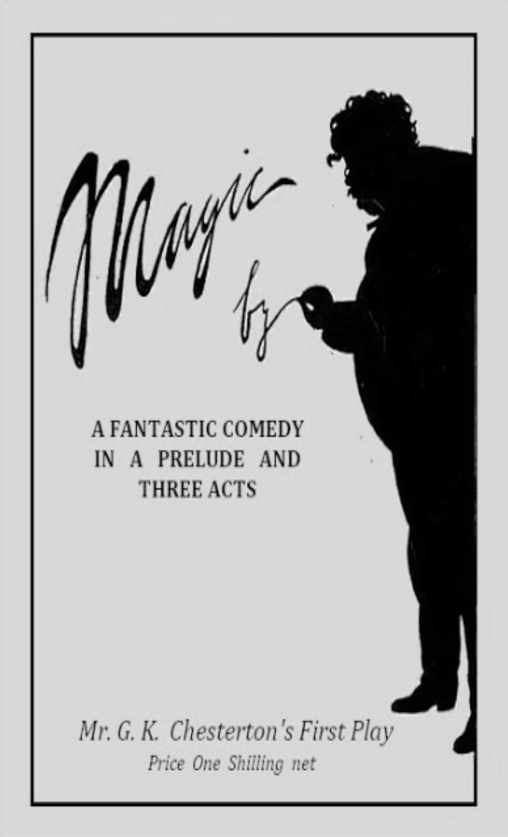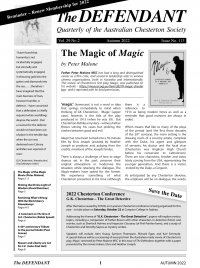Father Peter Malone MSC has had a long and distinguished career as a film critic, and served in leadership roles in various cinema organisations, both in Australia and internationally. This review of Chesterton’s first play, Magic, was published on his website – Missionaries of the Sacred Heart – and is reprinted with his kind permission.

‘magic’ (lowercase) is not a word or idea that springs immediately to mind when thinking of GK Chesterton. ‘Magic’ (upper case), however, is the title of the play produced in 1913 (when he was 39). But Chesterton did like a mystery – witness Father Brown solving his cases but probing the clashes between good and evil.
Magic has now been turned into a 70-minute film by Elvis Joseph (assisted by Heather Joseph as producer and, judging from the credits, members of the Joseph family).
There is always a challenge of how to stage dramas set in the past: preserve their original atmosphere or modernise the situation while retaining the dialogue. The Magic-makers have opted for the former. We experience something of what Chesterton presented in his time (although
there is a reference to 1913 as being modern times as well as a reminder that good manners are always in order).
Which means that like so many of the plays of the period (and the first three decades of the 20th century), the main setting is the drawing room of a country estate, complete with the Duke, his agent and glimpses of servants, his doctor and the local vicar (Chesterton was Anglican High Church before his conversion to Catholicism). There are two characters, brother and sister, lately coming from the US, representing the younger generation. And there is a visitor, invited by the Duke, a Conjuror.
As anticipated by any Chesterton devotee, the emphasis will be on dialogue, the words, intonations, pauses… Which means that this Chesterton devotee needs to be a listener, an attentive listener.
Chesterton was a philosopher and theologian so this is not going to be just smart and witty dialogue and, because the makers of opted to stay with so much indoor action, though sometimes out in the street obsessed with a lamp that changes colour, magically, the film does resemble a staged play, stage performances, but editing enabling the audience to shift focus of attention from one character to another, often quickly, compelling us to notice and to be watchers as well as listeners, attentive to body language and facial expressions.
But, of course, with Chesterton, he challenges not only by what the characters are saying but by what they mean.
QED is not what we expect at the end of a Chesterton article or book (except Father Brown’s crime solutions). Chesterton does not solve. He probes.
The screenplay uses the device of a narrator – but here it is the writer of the story, busy at his typewriter (1930s look) but then out and about in the evening, walking, thinking, pondering.
And then we have the Conjurer, meeting Patricia in the garden, talking about fairies and magic but also introducing the theme of how much we should believe in ourselves. This makes us check where we stand. And this is immediately confirmed, schematically, by the appearance of the rationalist, the doctor, on the one hand and on the other the man of faith, Mr Smith the vicar (though Chesterton does not give him much faith-filled dialogue).
Since the Duke has invited the conjurer (and the Duke is self-satisfyingly comfortable on both sides of a cause and argument) to demonstrate magic, this leads to some emotional drama with the young man, Morris, modern and sceptical and a scorner, who becomes obsessed with one of the tricks, concerning the changing colours of the streetlamp. He rants, hyperventilates, and it drives him mad, literally. Conjurer give him a solution, the truth or a lie?
So, we are in the world of Chesterton Paradox.
Is life reasonable? Is making sense of it reasonable? But is life able to be reasonable about? Probing life and its meaning without drawing up a set of rationalist principles? And the Conjurer reminds us that we have our demons. We have our spirits. Who are they? What are they? Do they control us?
Perhaps the best response to Magic (unless you watch it with the Pause button and take time off to thinks scenes through) is to let the dialogue wash over us, letting it seep into our consciousness, influencing our understanding – a 70 minute contribution by the Chesterton intelligence to what human existence is.
